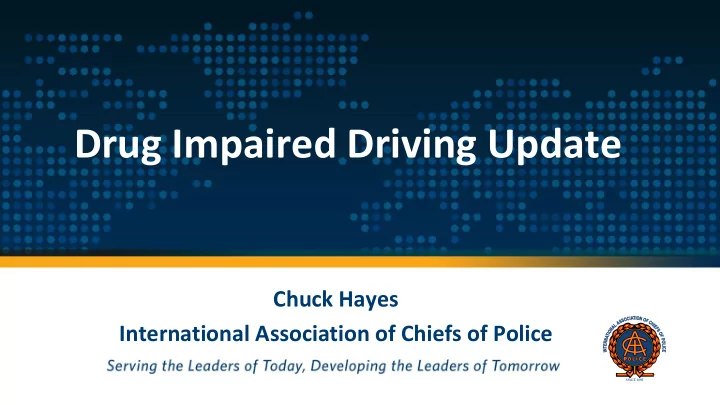

Drug Impaired Driving Update Chuck Hayes International Association of Chiefs of Police
Drugged Driving For many years an under-recognized highway safety problem Exact impact on highway safety not exactly known National on-going efforts to address the problem
Drugged Driving Research 2013 – 2014 Roadside Survey of Alcohol and Drug Use by Drivers: Weekend nighttime drivers testing positive for illegal drugs or medications increased from 16.3% in 2007 to 20% in 2013-2014. One in four drivers tested positive for at least one drug that could affect safety - an increase of 23% from 2007.
Self Reported Drugged Driving • 9.9 million people (aged 12 or older) reported driving under the influence of illicit drugs in the previous year (2013 NSDUH Survey) • CO and WA poll of marijuana users showed 43% admitted driving under the influence of marijuana in the past year (PLOS, Jan. 22, 2016)
Police Finding More Drugged Drivers on Pennsylvania Roads CNHI, January 30, 2016 • Almost 4 in 10 DUI arrests in 2014 involved drugs • In 2014, 52,636 people were arrested for DUI – a decease of approximately 1,400 drivers. However, drugged driving arrests increased 20,691 - nearly a 10% increase from the previous year
Law Enforcement’s Drugged Driving Countermeasures • Standardized Field Sobriety Testing (SFST) “The Foundation” • Advanced Roadside Impaired Driving Enforcement (ARIDE) – “Intermediate Level” • Drug Recognition Expert (DRE) – “Advanced Level”
ARIDE Training (Advanced Roadside Impaired Driving Enforcement) • Training conducted by DRE Instructors • 563 ARIDE Schools conducted in 2014 • 10,418 officers trained in 2014 • 46,620 trained since the program’s inception in 2009 • Approximately 600 courses g conducted in 2015
ARIDE and DRE Training ARIDE - • 16 hours of classroom training DRE - • 72 hours classroom field certifications • Field certification using impaired subjects • Comprehensive final exam • Recertification every 2 years
Drug Recognition Experts (DRE) • One of the best detection and enforcement “tools” for addressing drugged driving • Over 7,500 officers trained as DREs nationally • Approximately 2,660 law enforcement agencies with DRE’s nationally
DRE Training • Most advanced and in-depth drugged driving detection training available • 75 DRE Schools held in 2015 • 1,466 officers trained as DREs in 2015 • 65 DRE Schools scheduled in 2016
DREs Making An Impact • 28,088 DUI-Drug Enforcement Evaluations in 2014 (An increase of 6,387 from 2013) • 2015 Labor Day Impaired Driving Crackdown: DREs accounted for 8,615 DUI-Alcohol arrests, and 1,171 DUI-Drug arrests (Increase of 26% from 2014) DREs conducted 1,437 drug evaluations of suspected drug-impaired drivers (Increase of 116% from 2014)
DRE Drug Categorization: Based on Pattern of Indicators (Signs and Symptoms)
The DRE Seven Drug Categories • CNS Depressants • CNS Stimulants • Hallucinogens • Dissociative Anesthetics • Narcotic Analgesics • Inhalants • Cannabis
Legal Issues and Challenges • SFST’s - validated for alcohol but not for other drugs • DRE’s are not doctors and cannot conduct and interpret vital signs • DRE’s are not trained well enough to formulate opinions of drug impairment
Common DRE Challenges • P rocedures are “New” or “Novel” • T ests are “subjective” - subject to error • Opinion based on admissions by suspect • Missing “signs” • Normal signs • Not medically trained • Lab did not confirm the drug
Drugged Driving Challenges • Education and public awareness of the drugged driving problem • MJ legalization – increased legalization equates to more impaired drivers • Not enough officers trained to detect drugged drivers, with special emphasis on marijuana impairment
Additional Challenges • Training and educating prosecutors to prosecute DUI-Drug cases, and especially DUI-Cannabis cases • Consistency in laboratory drug testing for DUI-Drug cases • Developing roadside oral drug testing devices for law enforcement
Legal Issues and Challenges The Admissibility of DRE Testimony and Evidence The DRE process is not a test. It is a method for collecting evidence, a tried and true compilation of accepted medical theories and practices .
Montgomery County, Maryland DRE Ruling (State v. Crampton, March 2013) “The DRE collects data from physical observations that are in the realm of the DRE's specialized knowledge and training." “The DEC protocol and training allow the DRE to become a specialized observer.” J udge David A. Boynton, Circuit Court, Montgomery County, MD
IACP DEC Program Website www.decp.org 20
The 22 nd Annual IACP Conference on Drugs, Alcohol and Impaired Driving Denver, Colorado August 13 – 15, 2016 www.theiacp.org/dreconference 21
Questions and Assistance Chuck Hayes International Association of Chiefs of Police Law Enforcement Operations and Support DEC Program Training Coordinator hayes@theiacp.org
Recommend
More recommend